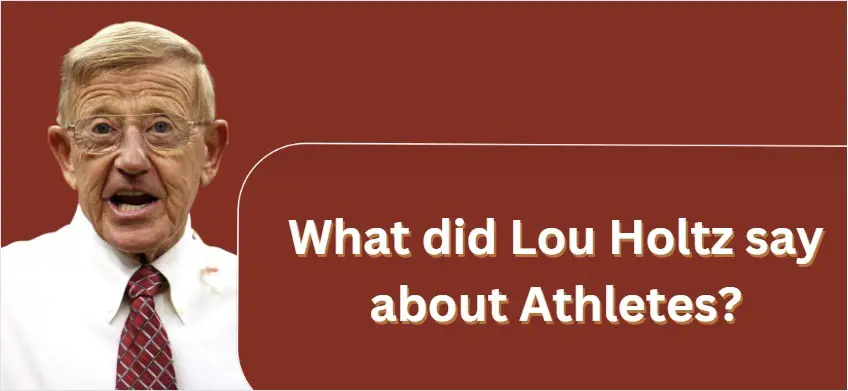In the ever-evolving world of sports, it’s fascinating to take a step back and reflect on the words of legendary coach Lou Holtz. Recently, he was asked about the differences between athletes today and those from 50 years ago. His response was both profound and thought-provoking: “Today’s athletes talk about rights and privileges. And the players 50 years ago talked about obligations and responsibilities! To me, that describes society today in all areas, including the workplace!”
This statement opens up a rich discussion about the values, mindset, and societal shifts that have shaped athletes over the years. Let’s delve into this intriguing perspective and explore the implications for the sports world and beyond.
The Changing Landscape of Athlete Mindset
Holtz’s observation sparks contemplation on the shift in mindset among today’s athletes compared to their counterparts from half a century ago. The emphasis on rights and privileges suggests a cultural evolution towards individualism and self-expression. While this isn’t inherently negative, it prompts us to examine how this shift impacts the broader sports landscape.
Athletes Today: A Focus on Rights and Privileges
In the contemporary sports arena, athletes are more vocal than ever about their rights and the privileges they believe they deserve. This shift can be attributed to a variety of factors, including increased awareness of social issues, advancements in communication platforms, and a changing societal landscape that encourages individuals to speak out.
Many modern athletes leverage their platforms to address social and political issues, advocating for change and using their influence to make a positive impact. This newfound sense of empowerment has undoubtedly brought about positive transformations, breaking down barriers and promoting inclusivity.
However, it’s essential to consider the potential downsides of an exclusive focus on rights and privileges. Does this mindset sometimes overshadow the importance of obligations and responsibilities?
Athletes 50 Years Ago: Embracing Obligations and Responsibilities
Lou Holtz’s comparison invites us to reflect on the athletes of yesteryear who, according to him, centered their discussions on obligations and responsibilities. This suggests a collective sense of duty and commitment that extended beyond personal interests.
In the context of sports, athletes from previous generations may have viewed themselves as ambassadors for their sport and role models for future generations. The emphasis on obligations and responsibilities implies a commitment to not only their own success but also the betterment of the sport and society at large.
Societal Implications Beyond Sports
Holtz’s observation extends beyond the realm of athletics, providing a lens through which we can examine broader societal shifts. The dichotomy he presents — between a focus on individual rights and privileges versus collective obligations and responsibilities — resonates across various aspects of contemporary life.
Workplace Dynamics: A Mirror of Societal Changes
The coach’s statement draws a parallel between the sports arena and the modern workplace. As athletes advocate for their rights, employees in various industries assert their demands for fair treatment, equality, and improved working conditions.
This reflection prompts us to consider whether the emphasis on individual rights has led to a potential imbalance, with the importance of collective obligations and responsibilities occasionally taking a back seat. Striking a harmonious balance is crucial for fostering a healthy and productive work environment.
Navigating the Interplay: Finding Harmony
As we navigate this interplay between individual rights and collective responsibilities, it’s essential to recognize the value of both perspectives. Athletes advocating for their rights contribute to positive change, pushing for inclusivity, diversity, and social justice. Simultaneously, maintaining a sense of obligation and responsibility ensures that these efforts are grounded in a broader commitment to the common good.
Conclusion: A Call for Balance and Reflection
In conclusion, Lou Holtz’s insightful observation serves as a catalyst for introspection and dialogue. The evolution of athlete mindset reflects broader societal changes, with a shift from collective obligations to individual rights. While the emphasis on rights has fueled positive change, it’s crucial to strike a balance that acknowledges the importance of obligations and responsibilities.
As we continue to witness the dynamic landscape of sports and society, let Holtz’s words inspire conversations that foster understanding, empathy, and a collective commitment to building a better future — both on and off the field.
FAQs
Q: Who is Lou Holtz?
A: Lou Holtz is a retired American football coach and analyst, widely regarded as one of the most successful and respected figures in college football history. Born on January 6, 1937, in Follansbee, West Virginia, Holtz made a significant impact on the sport over the course of his coaching career.
Holtz gained prominence for his successful tenure as the head coach of the Notre Dame Fighting Irish football team, leading them to a National Championship in 1988 and amassing 100 wins during his time there. His coaching career also included notable stints at institutions such as William & Mary, North Carolina State, and Arkansas.
Apart from his achievements on the field, Holtz is known for his motivational and inspirational speeches, as well as his insightful analysis as a college football commentator. His legacy in college football is marked by his ability to build successful programs and his influence on players both on and off the field.
Q: What did lou holtz say about athletes?
A: Lou Holtz was quoted saying, “Today’s athletes talk about rights and privileges. And the players 50 years ago talked about obligations and responsibilities! To me, that describes society today in all areas, including the workplace!” This statement by Holtz highlights his perspective on the shift in mindset among athletes over the years, emphasizing a change from a focus on obligations and responsibilities to a more contemporary emphasis on rights and privileges.



